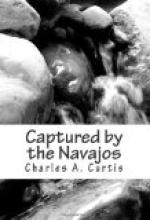A shout from our rear caused us to look towards the shore we had just left, and we saw the post-adjutant sitting on his horse on the embankment. He said: “Three Navajos have escaped from the guard. Send word to Captain Bayard to try to recapture them. If they get away they will rouse their people against you, and your march through their country will be difficult.”
[Illustration: “Mounted, the boys presented A warlike appearance”]
I wrote a brief message, handed it to Corporal Frank, and when the boat touched the western landing he dashed off at full speed in the direction of camp.
The afternoon was well advanced when Henry and I, with the infantry, entered the first camp of our march. We found Frank awaiting our arrival, and learned from him that Captain Bayard had sent two detachments of cavalry in pursuit of the Indians, and that they had returned after a fruitless attempt to follow the trail.
On our first evening in camp many of the officers and civilians gathered in groups about the fires for protection against the mosquitoes, to smoke, to discuss the route, and to relate incidents of other marches. Captain Bayard took from his baggage a violin, and, retiring a little apart, sawed desperately at a difficult and apparently unconquerable exercise. There I found him at the end of a tour of inspection of train and animals, and obtained his sanction to a plan for the employment of the boy corporals.
I proceeded to tell the boys what their duties would be. Corporal Frank was to see to the providing of wood, water, and grass while we were on the march. He was further instructed that he was to conform his movements to mine, and act as my messenger between the train, the main body, and the rear guard. These were to be his regular duties, but he was to hold himself in readiness for other service, and be on the alert for any emergency.
The odometer with which to measure the distance to Prescott was placed in charge of Corporal Henry, and he was told to strap this to the spokes near the hub of the right hind wheel of the last wagon in the train, taking care that the wagon should start from the same point where it had turned from the main road into camp the previous day. He was to report the distance we had marched to the commanding officer at guard-mounting, which, on the march, always takes place in the evening instead of morning, as at posts and permanent camps. After reaching Fort Wingate, and taking up the march beyond, he would ride with the advance, and act as messenger of communication with the rear; but until then he would ride with his brother and me.
The next morning found all ready for a start at three o’clock. The boy corporals found it a hardship to be wakened out of a sound sleep to wash and dress by starlight and sit down to a breakfast-table lighted by dim lanterns. There was little conversation. All stood about the camp-fires in light overcoats or capes, for Western nights are always cool.




